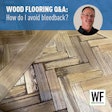Q: We just opened a retail store after years of being carpet installers. Are there any tips you might suggest to help us sell prefinished hardwood flooring?
A: If this question had to be answered in one sentence, I would suggest this: Listen carefully to the customer and manage her expectations. Sounds simple. However, I continue to be amazed at how often I hear from a customer who has been told something completely wrong or was supplied with the wrong product for a particular application. While selling wood flooring does not have to be complicated, it does take some common sense and the right attitude. It is always a good idea to educate yourself about the products you offer. After more than 15 years in the industry, I still learn something new almost every week about wood flooring products and their proper care and installation. So, while continued education is a must, here are some non-technical guidelines for selling prefinished wood flooring.
You Don't Have to Know Everything, But …
Selling prefinished flooring requires that you make yourself as knowledgeable as possible about the products you offer. As a salesperson, you are the perceived expert. That doesn't mean that you must know everything. What it does mean is that you must be honest about what you tell the customer, as well as about what she can expect. When you aren't sure about the answer to a question, contact people who do know and get back to the customer. I have made a career out of contacting intelligent people in the industry and/or relying on the manufacturer to guide me on difficult issues. There is certain magic about getting back to the customer with the correct answer.
Although you are simply relaying information, she sees you as the expert. While I often lack the knowledge to answer all the questions I get on a daily basis, I don't lack the will to find the answer for my customer. That's the difference. This also explains why it's important to attend installation schools, factory training and other related courses. At these functions, you will gain valuable information while establishing great contacts on whom you can rely in the future.
Listen and Ask Questions
I once witnessed a retail salesperson talk non-stop to a customer. He was so busy trying to impress her with all the things he knew, that he didn't take time to listen. After about 20 minutes of hard selling and offering many product suggestions, the customer, a polite older lady, simply stated: "Well son, I have to purchase this particular floor because I need it to finish the other half of the room." Taking the time to listen can help you address the customer's needs more effectively. Don't take anything for granted. By asking questions, you will learn valuable information that will help you meet the customer's needs. Over time, you learn what questions to ask. Just remember how important is it to listen and ask questions!
Manage the Customer's Expectations
You are in the middle of working with a customer, and she is very close to picking a beautiful American cherry floor when she says, "I left my two dogs with the neighbors, so I don't have a lot of time." What do you do? The correct answer, of course, is to immediately make sure that she understands that dogs' toenails often can (I would probably say "definitely will") scratch the floor. Yes, I know, this could kill the sale. But, believe me, it's better to have her see you as someone protecting her best interests and ensuring that she purchases the correct product rather than have her come back a month later with complaints about all the scratches in the floor.
Inform the customer that a wood floor can indeed dent, scratch and even change color over time depending on various factors. These are things that a customer needs to hear. Of course, there are many other issues that should be addressed. Listen to the customer and learn what is important to her. Find out what she liked and disliked about other floors she previously owned. For example, there could be an issue with the grade of product the customer is buying. You should explain that a "low grade" or "off-fall" flooring choice might contain a large number of shorts or have open knots, etc. In other words, it is always better to explain all the things you know could be a problem with a wood floor. If you overdo it, then the customer has a better floor than she expected. If you are right, then she was warned and, in my experience, rarely complains, because she was told up front. I call it "being honest with customers and treating them as you would want to be treated." Many call it "managing customers' expectations."
Doesn't this sound simple? It is. Taking care of a customer doesn't require an M.B.A. from Harvard, but is does require you to be honest and as informative as you can. If you do this consistently, I believe that your business will grow, and that the experience will be more enjoyable for both you and your customers.






























